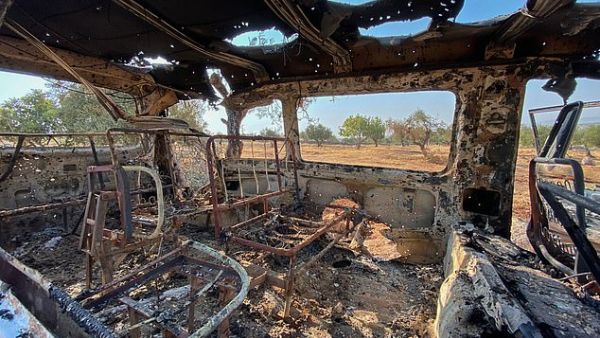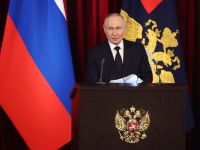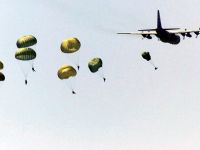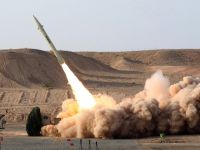The leader of the Islamic State militant network is believed to be dead after being targeted by a US Special Forces raid in north-west Syria.
Abu Bakr al-Baghdadi, the leader of a self-declared caliphate, is thought to have detonated his own suicide vest during the targeted attack on his lair in Syria's Idlib province.
He was with two wives, who are also thought to have blown themselves up, and children which are believed to still be alive.
Officials say confirmation that the ISIS chief was killed in the explosion is pending, with President Trump is set to make a 'major statement' at the White House at 1pm (GMT).
The ISIS leader has been among US and Europe's force's most wanted figures since his chilling call to arms in 2014, which saw a shift away from the mass casualty attacks carried out by al-Qaeda in favour of smaller-scale acts of violence.
Shifting away from the airline hijackings and other mass-casualty attacks that came to define al-Qaeda, al-Baghdadi encouraged smaller-scale acts of violence that would be harder for law enforcement to prepare for and prevent.
He encouraged jihadists who could not travel to the caliphate to kill where they were using whatever weapon they had at their disposal, resulting in a series devastating attacks in the UK and Europe.
His words inspired more than 140 terrorist attacks in 29 countries other than Iraq and Syria, resulting in the deaths of at least 2,043 people, CNN reports.
Al-Baghdadi led ISIS for the last five years, presiding over its ascendancy as it cultivated a barbaric reputation for beheadings and horrific executions.
These recordings, often noted for their high production values, were distributed online along with the ISIS propaganda magazine Dabiq.
He remained among the few ISIS commanders still at large despite multiple claims in recent years about his death and even as his so-called caliphate dramatically shrank, with many supporters who joined the cause either imprisoned or jailed.
With a £19.5 million ($25m) bounty on his head, al-Baghdadi had been far less visible in recent years, releasing only sporadic audio recordings, including one just last month in which he called on members of the extremist group to do all they could to free ISIS detainees and women held in jails and camps.
{"preview_thumbnail":"https://cdn.flowplayer.com/6684a05f-6468-4ecd-87d5-a748773282a3/i/v-i-e…","video_id":"ebaf2d7b-b30b-4a68-b852-d46a06c25229","player_id":"8ca46225-42a2-4245-9c20-7850ae937431","provider":"flowplayer","video":"ISIS Leader Abu Baker Al Baghdadi Killed in US Air Strikes"}
The Syrian Observatory for Human Rights reported an attack carried out by a squadron of eight helicopters accompanied by a warplane.
The attacks were on positions where ISIS operatives were believed to be hiding in the Barisha area north of Idlib city, after midnight on Saturday-Sunday.
It said the helicopters targeted ISIS positions with heavy strikes for about 120 minutes, during which jihadists targeted the helicopters with heavy weapons.
The Syrian Observatory documented the death of nine people as a result of the coalition helicopter attack, adding that the death toll is likely to rise due to the presence of a large number of wounded.
The strike came amid concerns that a recent American pullback from northeastern Syria could infuse new strength into the militant group, which had lost vast stretches of territory it had once controlled.
The purported audio was his first public statement since last April, when he appeared in a video for the first time in five years.
In 2014, he was a black-robed figure delivering a sermon from the pulpit of Mosul's Great Mosque of al-Nuri, his only known public appearance.
He urged Muslims around the world to swear allegiance to the caliphate and obey him as its leader.
'It is a burden to accept this responsibility to be in charge of you,' he said in the video.
'I am not better than you or more virtuous than you. If you see me on the right path, help me. If you see me on the wrong path, advise me and halt me. And obey me as far as I obey God.'
The reported death of such a high-value US target comes amid a difficult political backdrop fro Trump, who has been frustrated heavy media focus on the Democratic-led impeachment inquiry, which he calls an illegitimate witch hunt.
He has also faced withering criticism from both Republicans and Democrats alike for his US troop withdrawal from northeastern Syria, which permitted Turkey to attack America's Kurdish allies.
Trump was expected to make the statement in the White House Diplomatic Reception Room, which he has used to make a number of major announcements.
Just last week he used the same room to announce that a ceasefire between Turkey and the Kurds had taken hold.
This article has been adapted from its original source.








